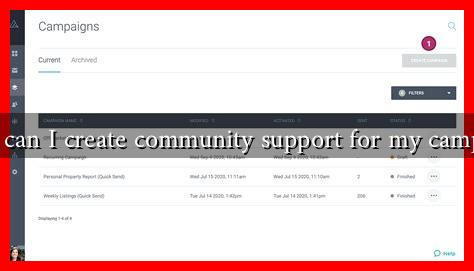-
Table of Contents
How Can I Create Community Support for My Campaign?
Building community support for a campaign is essential for its success, whether it’s a political initiative, a social cause, or a local project. Engaging the community not only amplifies your message but also fosters a sense of ownership and commitment among supporters. This article explores effective strategies to cultivate community support, backed by examples and statistics.
Understanding Your Community
Before launching your campaign, it’s crucial to understand the community you aim to engage. This involves researching demographics, interests, and existing community dynamics. Here are some steps to consider:
- Conduct Surveys: Use online tools like SurveyMonkey to gather insights about community needs and preferences.
- Host Focus Groups: Organize small group discussions to dive deeper into community concerns and aspirations.
- Analyze Local Trends: Look at local news, social media, and community forums to identify pressing issues.
For instance, a study by the Pew Research Center found that 70% of Americans believe that community engagement is essential for addressing local issues. Understanding these dynamics will help tailor your campaign to resonate with your audience.
Building Relationships with Community Leaders
Community leaders, including local politicians, business owners, and activists, can be instrumental in rallying support for your campaign. Here’s how to engage them:
- Identify Key Influencers: Research who holds sway in your community and reach out to them.
- Establish Partnerships: Collaborate on initiatives that align with your campaign goals.
- Attend Local Events: Participate in community gatherings to network and build rapport.
For example, during the 2020 U.S. elections, many candidates successfully partnered with local organizations to amplify their messages, resulting in increased voter turnout in their communities.
Utilizing Social Media and Online Platforms
In today’s digital age, social media is a powerful tool for building community support. Here are some strategies to leverage these platforms:
- Create Engaging Content: Share stories, videos, and infographics that highlight your campaign’s mission and impact.
- Encourage User-Generated Content: Invite supporters to share their experiences and perspectives related to your campaign.
- Host Virtual Events: Organize webinars or live Q&A sessions to engage with your audience directly.
According to a report by Sprout Social, 64% of consumers want brands to connect with them on social media. This connection can translate into community support for your campaign.
Organizing Community Events
Hosting events is an effective way to bring people together and foster a sense of community. Consider the following types of events:
- Workshops: Offer educational sessions that align with your campaign’s goals.
- Community Clean-ups: Organize volunteer days to address local issues while promoting your campaign.
- Fundraisers: Host events that raise money for your cause while building community ties.
For instance, the “March for Our Lives” movement organized numerous community events that not only raised awareness about gun control but also galvanized support from diverse groups across the nation.
Measuring and Adapting Your Approach
Finally, it’s essential to measure the effectiveness of your community engagement efforts. Use tools like Google Analytics and social media insights to track engagement metrics. Here are some key performance indicators (KPIs) to consider:
- Engagement rates on social media posts
- Attendance at events
- Growth in email newsletter subscriptions
By analyzing this data, you can adapt your strategies to better meet the needs of your community and enhance support for your campaign.
Conclusion
Creating community support for your campaign is a multifaceted process that requires understanding your audience, building relationships, leveraging digital platforms, organizing events, and measuring your impact. By implementing these strategies, you can foster a strong sense of community ownership and commitment to your cause. Remember, a campaign is not just about the message; it’s about the people who believe in it. For more insights on community engagement, check out resources from the National Council of Nonprofits.

